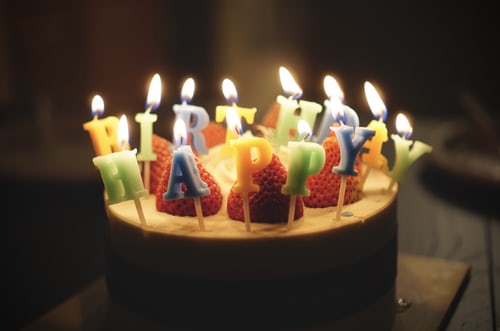On May 23, we’ll celebrate Pentecost—Christianity’s one thousand, nine hundred and eighty-eighth birthday. One thousand nine hundred and eighty-eight years ago God ushered the church age into history.
But what’s so special about this birthday? Why do we celebrate it year, after year, after year? Why is any birthday special enough to deserve yearly recognition?
And what do you need to have a good birthday party?
Before we look closely at Pentecost specifically, let’s examine some birthday characteristics—
If you’re older you probably reminisce about past birthdays, or those of your children or grandchildren. You’ll remember what life was like back then, what you got, what was special in your life. You might even get one of those nifty cards that remind you that a loaf of bread cost a nickel, or a candy bar was a dime. And that triggers you to reminisce about the good old days.
When you were younger—a lot younger—you probably counted the days leading up to the birthday, especially the big ones – like ten – when you finally made double digits, and thirteen – when you could finally call yourself a teenager; and then eighteen (when you thought you owned the world), and twenty-one (when you knew you did!). And then came 30 years, 50 years, 75…
And you may mentally gaze into the future to contemplate what awaits you next year, or make a list of “to do’s” to accomplish.
Birthday party basics—
You need to have a guest of honor
You need to set the place and time of the party – so everyone knows when and where to show up
You need an invitation list
Then you need to compile a guest list (noting the invitees that promised to join you to celebrate.)
The Pentecost party—
As I take you through Pentecost, you’ll see that the birthday celebration characteristics are present—reminiscing about the past, counting down the days, thinking about the future.
And we’ll recognize that we have all of the necessities for a really good party:
- a pre-arranged place and time, (Jerusalem during a festival)
- an invitation list, (the disciples and followers)
- a guest list, (disciples, followers, and soon-to-be new believers)
- and, most importantly, a guest of honor, (the Holy Spirit)
A little Pentecost history—
While the church celebrates Pentecost, Pentecost is not originally a church celebration. It was a Jewish celebration that had been going on since God dictated the Book of Deuteronomy to Moses. It’s a feast day, an end to the fifty days after Passover; where first fruits and thanksgiving are presented before God.
So, I want to take you back 1,988 years, when God had a big party and initiated the church age. I want you to view this event – this special birthday – through Jewish eyes.
The Christian Pentecost story—
Imagine you’re a Jew, a follower of Christ, sitting in that Upper Room with about 120 other Jewish disciples on that special feast day. You’re praying and singing psalms and excitedly anticipating what will happen. What Jesus promised would happen.
Ten days ago, just before you watched Him ascend into heaven, Jesus commanded you to go to Jerusalem and wait for the baptism of the Holy Spirit – the Divine Presence of God. Jesus said you’d receive power when the Holy Spirit came upon you, and that you’d be a witness to Him in Jerusalem and to the ends of the earth. But how can that be? Then your mind retraces the last fifty days.
So much has happened.
First, Jesus celebrated the Passover with the small group of twelve disciples and then hours later you watched as the crowd called for Jesus to be crucified. When Pilate gave the order, you and Jesus’s closest disciples – besides John and some of the women – ran in terror to hide, fearing you’d be arrested too. You hid for two days, scared and confused. Your hearts were broken. You had all been so sure Jesus was the prophesied Messiah who would deliver you from the oppressive Roman yoke.
Then the Sunday morning after the crucifixion, stunning news came that Jesus had risen from the dead and appeared first to the women and then to some of the other disciples. Breathlessly, they told you about it. And you and the others reasoned together about the Resurrection.
It all started to make sense.
Now, fifty days later, you’re in Jerusalem where a multitude of Jewish pilgrims from a multitude of countries has gathered to celebrate.
Passover was one of the three great festivals God commanded the Jews to celebrate. Every year since you were little, your family made a pilgrimage to Jerusalem to sacrifice the Passover lamb. Three days later, you were to go to the temple for the Festival of First Fruits – the festival that celebrated the bountiful harvest God had provided.
And to prepare for that festival, every spring you and your family carefully scoured the wheat fields looking for the first swollen grains of the season. Then you’d eagerly mark these stalks with a ribbon, these first fruits of the harvest that were to be given to God. On the third morning after Passover, the priests would wave one of your dedicated sheaves before the Lord in the temple. Then, you were to count forty-nine more days, and return to Jerusalem to bring the first fruits of the barley harvest to the temple on Shavuot, translated Pentecost in Greek.
It was always a time of great celebrating. Your mother decorated the house with greenery to remind you of Mt. Sinai and made special dairy meals – to remind you that Israel is the land of milk and honey. The rabbis compared it to a wedding between God and His people. And it was the day King David was born, and died. You knew it was the ultimate expression of the unique joy of the land. And your parents always had you repeat the Deuteronomy verse you memorized: “And you shall rejoice in every good thing which the Lord your God has given you.”
But this year, Jesus’s death threw you, your friends, and most of Jerusalem into an uproar. The Sanhedrin hadn’t wanted Jesus to die during the festival, but it happened anyway. Then the eleven remaining disciples told you and the others about the new covenant Jesus had initiated at the last Passover he ate with them. That shocked and confused everyone. His body and his blood given for them? That was a marriage covenant he had recited! Then Jesus was raised from the dead on the first day of First Fruits!
Following that stunning event, Jesus met with you and His other followers for forty days, to teach, to lead, to forgive. Then ten days ago he returned to heaven. You stood and watched Him bless you and the others while He was being taken up into the clouds. He promised again that he would not leave you alone; he promised that his power would come to you. He was adamant that you were to go to Jerusalem—and wait.
Now you’re doing just that, sitting in the Upper Room house. Waiting.
You know the celebration is starting. Just this morning you heard the temple official call out, “Arise! Let us go up to Zion, to the Lord our God!”
It’s officially the day that the season of Passover ends. And you’re sure it will happen on this day – this final day of celebration of First Fruits; where the barley harvest will be baked into two loaves and offered before the Lord at the temple. You now know Jesus is The First Fruit of the harvest. And to send the Holy Spirit on this day – the day Israel recognizes as the day the law was given on Mt. Sinai – would also be a fulfillment of prophecy. After all, Jesus had said that He came not to destroy the law but to fulfill it!
Then you hear it! An enormous, deafening sound like a violent rush of wind. The air itself isn’t stirred; just a powerful sound fills the house. Then divided tongues, looking like fire, appear in the room; one resting on each person’s head. And King David’s psalm floods your mind, “The voice of the Lord divides the flames of fire. The voice of the Lord shakes the wilderness.” And someone else excitedly reminds everyone about the smoke and fire that appeared on Mt. Sinai the day God gave Moses the law!
This has to be it! The Divine Presence of God—the Holy Spirit that Jesus had promised.
Suddenly you and the others speak in different languages. You’ve never studied another dialect, but immediately you’re given the ability to do so. What God started at the Tower of Babel, he has reversed on this day!
All of you run to the temple. It is crowded with Jewish pilgrims from as far away as Iran, Iraq, Rome, Turkey, Libya, Crete, Arabia, and Egypt. They are there to offer their first fruits barley harvest.
And it’s clear that they, too, heard the sound because they have gathered together, bewildered and astounded because you and the others are speaking to them as quickly and excitedly as you can about Jesus, and how his death and resurrection fulfill prophecy and give eternal life. Your heart burns within you as you share this good news.
The crowd listening to you is amazed and perplexed because they understand your words. Some of them get excited and ask you what it all means. They’re eager to know more. Yet others sneer and accuse you of having made some strong wine from your new crops and partaken of it this morning. Gotten drunk from the fruits of your field.
So Peter stands with the other eleven before the crowd and tells them that you aren’t drunk; it’s too early for the celebratory drinking to start. Then he reminds everyone of Joe’s prophecy, where God says that in the last days He will pour out his Spirit upon all flesh, and everyone shall prophecy; that people will see visions, and even the old will have dreams. Everyone, slave and free alike, will receive this power from God.
Then Peter reminds us that Joel also prophesied about the future – where God will cause signs in heaven and on earth. Signs like flood, and fire, and smoky mist; like the sun turning to darkness and the moon to blood, before the Lord’s final return on His judgment day.
Three thousand people believe the message they hear and receive the Holy Spirit. And they hurry back to return to their homes to share the good news of salvation and life through Jesus the Jewish Messiah. No longer will they have to live under the weight of the law. Now they’ll live under grace, just like you.
You know instinctively that it’s the start of a mission that will take all of you to the ends of the earth. The greatest mission the world has ever known.
The Holy Spirit has enabled you for Christ’s service – to share this good news with others, so that they might also know about Jesus and receive His joy of eternal life. It’s the most important thing Jesus calls you to do. And you must be obedient to him. You won’t be afraid because now He’ll be with you wherever you go.
Months later Dr. Luke interviews all of you, so he can make an accurate account of the church’s birth, for future generations to read, remember, and celebrate.
Keeping the party going—
And now, let’s come back to the present—to our celebration this year: 2021.
There’s still inviting and joining and celebrating and praising going on.
Every day people find or hear about the Messiah, and they want to share that joy and hope and promise with the world.
I pray you’ve been invited and said yes to Jesus’s invitation to join Him, received his gift—the power of his Holy Spirit—become one of His disciples, and have your name written on the official guest list.
In order for the party or banquet to happen, invitations are required and a guest list needs to be generated. Like Philip, people need to turn to their friends or acquaintances and say, “Come and see.”
May I ask how many invitations you’ve passed out lately? When was the last time you gave an invitation to someone else to join this party—Jesus’ party?
When have you shown someone the gift of the Guest of Honor?
Maybe the person at work who irks you. Have you invited him to meet the Savior? The complaining, irritating old lady next door? The single mother who’s struggling with everything in life and void of resources, or hope? The indolent teenager whose father is AWOL?
Is your heart broken enough over their lost condition to invite them?
Remember who Jesus invited to the party: the sinners – the poor, the downtrodden, the liars, the thieves, the prostitutes, the adulterers, the prisoners, the blind, the lame, and the lepers; the outcasts and the misfits. He’s still inviting them to come, to be set free. He invites them to come and live a full, joyful life in and through Him.
Or maybe you know someone who’s so nice and kind they don’t seem to need a savior. (That’s a fallacy, by the way.) They do. No one is ever nice enough or kind enough or good enough. No one matches Christ. Only He—and faith in Him and the grace He offers—saves. You’re not getting into the eternal party without Him knowing you and calling you His friend.
After all, He doesn’t invite strangers to that final heavenly banquet.
So be careful about thinking that you can always just show people your good works without saying anything to them about Jesus.
The fallacy of just trying to show someone your faith rather than speaking it and giving out an invitation—
I’d like to illustrate my statement with this true story: Years ago in Seattle a man named Sam was saved and became a Christ-follower as a result of a Billy Graham event. Sam was so excited about what God did in his life, he told his boss about his relationship with Christ.
The boss said, “That’s great! I’m a Christian too, and I’ve been praying for you for years.”
But Sam was disappointed, and his countenance fell. He said, “Why didn’t you ever tell me? You were the very reason why I haven’t been interested in the Gospel all of these years!”
The boss responded, “How could that be? I’ve done my best, by God’s grace, to live a Christ-like life around you all this time.”
Sam said, “That’s the point. You lived such a model life without telling me that it was Christ who made the difference, so I convinced myself that if you could live such a good and happy life without Christ, then I could too” (Don Whitney, Spiritual Disciplines, 111).
Thank goodness this story has a happy ending, but how sad this person didn’t get the invitation sooner.
His boss was negligent.
God seems to enjoy seeing His people party—
God instituted a lot of feasts. He seems to be in the celebration business. He still has a wedding feast awaiting us in heaven. He’s got more invitations to pass out, more names to gather on the guest list.
But whom does He send to deliver the invitation?
Us.
You.
His friends.
Professional marketers know from research that it takes about seven to nine letters of invitation before someone responds.
How many times have you invited? Do you give up after a single attempt?
C.S. Lewis called God “the hound of heaven” because God never gives up. How often have you asked?
Have you prayed that God would go before you to prepare the heart of the person you want to invite? Have you prayed for Jesus to give you just the right words to speak to them, and for their ears and hearts to be open to the reception of the message? Do you pray—often—for God to provide opportunities for you to share the Gospel?
Do you invest in their life, listen well and hear their hearts? When you do, they’re more likely to respond to the invitation. You can prepare the ground and then plant and water.
Who’s on your invitation list?
Keep inviting. Keep sharing your story and the reason for your joy. Scour the fields; plant seeds. Prepare for God’s harvest.
Your family, your neighborhood, city, state, nation and world are your mission field. Go out and invite, taking the heart of God with you. As my former pastor said after one of his Sunday sermons: “Go fishing!”
When you’re having a party, you want people to come and share in the celebration with you.
When you’ve received a great gift, you want to talk about and share it. I’m sure there are special gifts you still remember and reminisce to others about.
Are Jesus and the Holy Spirit on that special gift list?
All of you have a special story to tell. Jesus has given you the power to tell it. But are you willing?
As John Wesley said, “I look on all the world as my parish, … I mean, that, in whatever part of it I am, I judge it … my bounden duty, to declare unto all that are willing to hear, the glad tidings of salvation.”
I ask you: how special is Jesus to you? Do you find him worth sharing? Do you consider it your duty to share those glad tidings of salvation with others?
As Paul later wrote to the Roman church, “How then shall they call on him in whom they have not believed? And how shall they believe in Him of whom they have not heard? And how shall they hear without a preacher? And how shall they preach unless they are sent? As it is written: How beautiful are the feet of those who preach the gospel of peace. Who bring glad tidings of good things!”
We’re recognizing Pentecost May 23. Will you be celebrating the birthday of the church? Will you be giving thanks for Jesus, grace, and His Holy Spirit that gives you the power to live and to hope?
Will you be handing out invitations to others to “Come and see”?
Do you have your guest list ready?
For the believer, it should be the greatest celebration birthday of the year.
Invite some friends, and have a great celebration!
Blessings,
Andrea
“Beloved, I pray that you may prosper in all things and be in health, just as your soul prospers.”
Andrea Arthur Owan, M.S., A.T., R., is a health and fitness pro, speaker, award-winning inspirational writer, memoirist, and senior-ordained chaplain (IFOC). She helps people thrive physically, emotionally and spiritually and recover from grief, loss and trauma.







